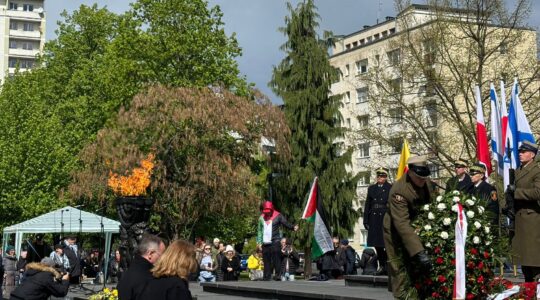Elana Katz, an American avant-garde performance artist now based in Berlin, seeks out the Demiris, father and daughter. She is looking for her next project site.
Katz has crowdsourced funding for her latest work, “Spaced Memory,” staged over European Jewish sites that have been erased.
A May performance in Belgrade involved a disused basketball court built in place of a synagogue destroyed in the 1950s. She wrapped the basket’s backboards in white cloth and scattered white dust over the court.
“Please join me in an action that will newly *cover* what has been covered for decades, in order to reveal its overwritten past,” she wrote in her Facebook invitation.
During the conference, Katz and Ines Demiri hung out together. Close in age, slim and dark, they might be cousins, yet they also present a studied modern Jewish contrast: The black-clad, Berlin-based New Yorker motored by a voracious curiosity and the Sephardic Balkan in muted business outfits answering some questions in modulated, low tones, dismissing others with mysterious aphorisms.
Before arriving in Kosovo, Katz interviewed former Kosovar Jews in Belgrade about the whereabouts of one-time Jewish sites in Prizren and Pristina. Now she is frustrated: Votim Demiri’s accounts mostly differ from what she heard in Belgrade.
He takes her to a soccer field that he says is a cemetery, but there are no signs of its former use. Katz persists with her quest for proof; she needs to be certain. How can one commemorate Jewish absence if there’s a chance Jews never actually were present at the site?
She asks Demiri if there’s someone else she should speak to.
“Who?”
“Someone older?”
“There is no one older than me,” Demiri says, and he and his daughter look at each other and laugh. Katz smiles.
Afterward, Ines Demiri bristles, although it seems clear she is also a little taken with Katz and her brash American assuredness.
“She tells us this synagogue may not be here, this cemetery may not be there,” Ines Demiri says. “How would she know? It is in our memories.”
The single site on which Demiri and Katz’s Belgrade contacts agree once was Jewish is the boxing club in Pristina, even if there’s some disagreement as to whether it was a yeshiva or community center. Katz is considering a performance there.
It’s no longer in use as a boxing club, although the owner hopes to revive it and name it for a Jew, or so he tells Katz. She has a picture of the club’s interior on her smartphone, its floor carpeted with shattered roof tiles and plaster.
At a celebratory dinner ending the conference, Katz tells Selimi, the deputy foreign minister, about the boxing club, and he gets excited. He knows the building, but was unaware of its Jewish origins. Part of the building apparently is privately owned, part belongs to the city. Katz wants Selimi’s help in securing it for a performance, but he has grander ideas.
Selimi, who owns a popular comics-themed downtown Pristina bar called the Strip Depot, starts thinking aloud. The government could use eminent domain to secure the whole building, and it could become a Jewish community center again, or a museum.
NEXT: A grandfather from Haifa






